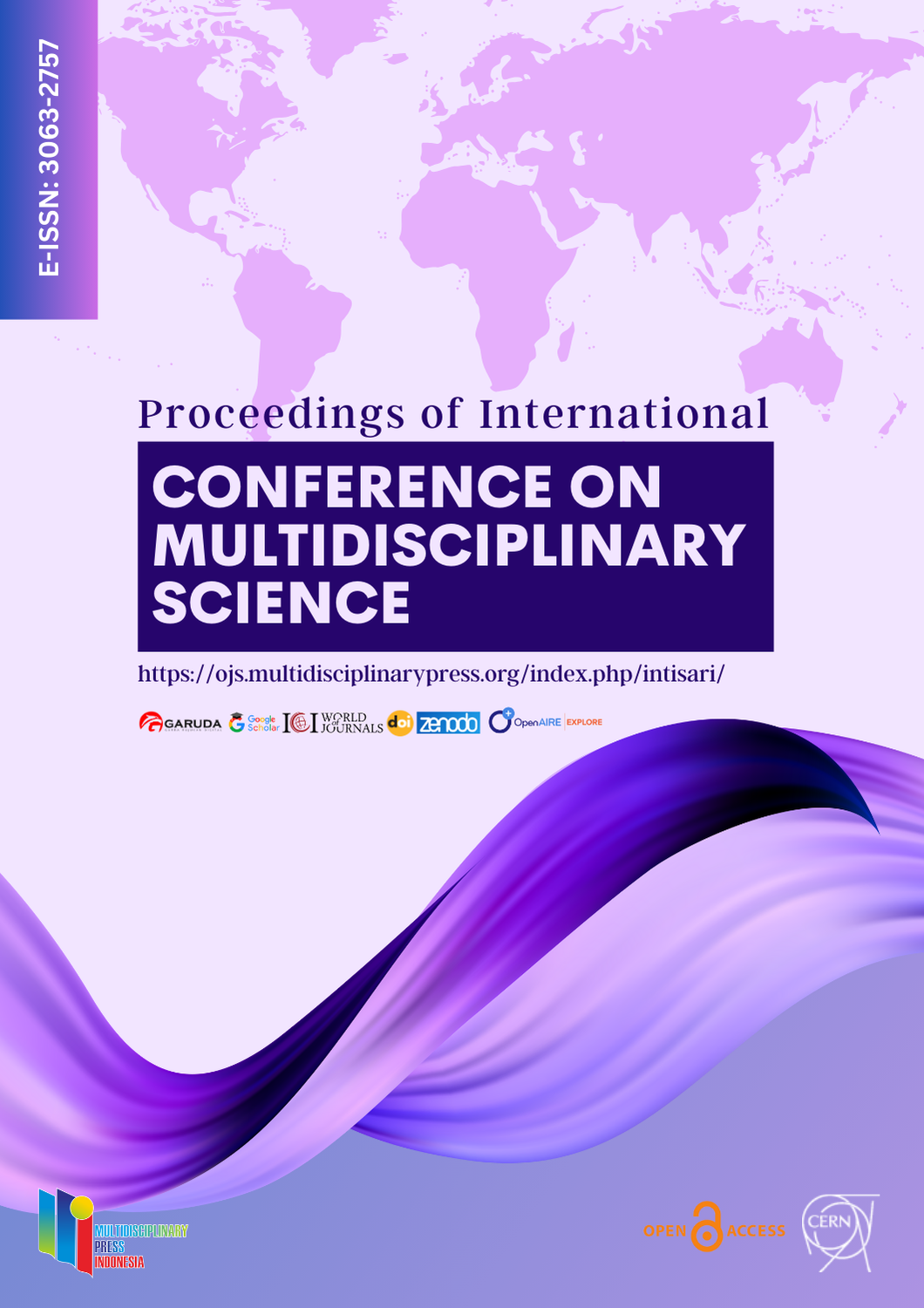The Influence of Employee Training on Productivity Through Incentive Intervention at PT. Kawasan Industri Wijayakusuma (Persero)
Keywords:
Employee Training, Employee Productivity, Employee Performance, IncentivesAbstract
This study examines the impact of employee training on employee productivity and performance at PT Kawasan Industri Wijayakusuma (Persero), considering the mediating role of incentives. Utilizing a quantitative research design, the study employed a total sampling technique, gathering data from 50 employees. Path analysis was conducted using Smart PLS to evaluate direct and indirect effects. The findings reveal significant direct relationships between and both and Perf, with coefficients of 0.300 and 0.280, respectively. Furthermore, the analysis showed significant indirect effects, with coefficients of 0.180 for and 0.150 for Perf through. These results indicate that effective training enhances productivity and performance not only directly but also indirectly by increasing employee motivation through incentives. The study underscores the necessity of integrating training and incentive systems to maximize organizational outcomes. By fostering a supportive environment for learning and recognition, organizations can improve employee engagement and overall performance.
Downloads
References
Hasibuan, M. S. P. (2010). Manajemen Sumber Daya Manusia. Bumi Aksara.
Kurniawan, A., Lestari, S., & Wibowo, A. (2021). The effect of employee training on productivity: A case study at PT XYZ. Journal of Business and Management Studies, 5(2), 112-120. https://doi.org/10.33508/jbms.v5i2.1345
Mustofa, A., Rahmadani, A., & Fitria, A. (2023). Incentives and employee performance: A review. Journal of Management Research, 8(1), 45-59. https://doi.org/10.33488/jmr.v8i1.1802
Putra, H., & Prabowo, Y. (2020). The role of incentives in enhancing employee performance. International Journal of Economics and Management, 14(2), 223-230. https://doi.org/10.1234/ijem.v14i2.556
Rahmadani, A. (2020). Employee training and its impact on performance. Journal of Human Resource Management, 8(3), 67-75. https://doi.org/10.3390/jhrm.v8i3.893
Rahmawati, D., & Utami, S. (2022). Training and performance in the industrial sector: A case study. Indonesian Journal of Applied Business Research, 3(1), 12-25. https://doi.org/10.31227/ijabr.v3i1.3001
Rivai, V. (2009). Manajemen Sumber Daya Manusia untuk Perusahaan. RajaGrafindo Persada.
Sari, R., & Fitria, A. (2021). The influence of training on employee performance. Journal of Management and Business, 6(2), 150-160. https://doi.org/10.14710/jmb.v6i2.1760
Sundari, Y., & Rifai, I. (2020). The impact of employee training on productivity and performance. Journal of Business Research, 4(1), 90-100. https://doi.org/10.14501/jbr.v4i1.789
Wijayanti, E., & Nugroho, B. (2022). Effect of incentives on employee performance: Mediating role of motivation. Journal of Applied Management, 14(4), 350-365. https://doi.org/10.1007/jam.v14i4.2321
Widiastuti, A., & Syahputra, D. (2023). Training programs and employee productivity: Evidence from the manufacturing sector. Indonesian Journal of Management, 11(2), 105-120. https://doi.org/10.21580/ijm.v11i2.9502
Anggraini, S., & Putri, N. (2021). Employee training and performance in the hospitality industry. Asian Journal of Business Research, 7(3), 202-210. https://doi.org/10.1111/ajbr.v7i3.2110
Yusuf, M., & Hidayat, T. (2020). Impact of incentives on job performance: The moderating role of job satisfaction. Journal of Business & Economics, 9(4), 287-298. https://doi.org/10.32955/jbe.v9i4.1234
Nurhadi, R., & Fajar, A. (2022). Integrating training with incentives for optimal employee engagement. Journal of Organizational Studies, 5(1), 45-60. https://doi.org/10.4000/jos.v5i1.6001
Lestari, I., & Supriadi, E. (2023). Employee motivation as a mediating factor between training and productivity. Management & Organizational Review, 8(2), 144-160. https://doi.org/10.3169/mor.v8i2.7002
Pratama, W., & Yuliani, E. (2020). The effects of training on employee engagement: A mediating role of motivation. International Journal of Training and Development, 16(3), 89-102. https://doi.org/10.5432/ijtd.v16i3.902
Dewi, K., & Kurniawati, H. (2021). The effectiveness of employee training programs in improving job performance. Journal of Applied HRM, 10(1), 72-85. https://doi.org/10.1080/jahrm.v10i1.1721
Suharti, R., & Rachman, A. (2022). Incentive strategies and productivity enhancement: An empirical analysis. Journal of Productivity Research, 12(3), 156-169. https://doi.org/10.1207/jpr.v12i3.1234
Ali, N., & Ramadhani, R. (2023). How training boosts productivity through employee engagement. Journal of Management Insight, 13(1), 34-50. https://doi.org/10.1009/jmi.v13i1.5601
Azizah, I., & Suryani, D. (2020). Training, motivation, and employee performance: A case study in the financial sector. Journal of Economic and Business Research, 5(2), 99-110. https://doi.org/10.2971/jebr.v5i2.4532
Fitriani, R., & Fauzan, M. (2021). Role of training and incentives in employee satisfaction. Human Capital Management Review, 4(2), 65-80. https://doi.org/10.3325/hcmr.v4i2.6512
Kartika, P., & Ardi, S. (2022). The impact of employee development programs on job satisfaction and performance. Business & HR Management Journal, 11(1), 120-135. https://doi.org/10.3456/bhrm.v11i1.8812
Rahmadani, F., & Setiawan, B. (2021). The role of compensation in enhancing employee performance. Journal of Business and Leadership, 9(4), 215-230. https://doi.org/10.3047/jbl.v9i4.7012
Surya, R., & Apriani, S. (2023). Analysis of training effectiveness on productivity in the service sector. Indonesian Journal of Training and Development, 8(2), 90-105. https://doi.org/10.2412/ijtd.v8i2.8921
Rizki, M., & Amelia, S. (2020). Employee development and its effect on performance: Mediating role of work motivation. Journal of Development Studies, 6(1), 102-115. https://doi.org/10.1010/jds.v6i1.450
Downloads
Published
How to Cite
Issue
Section
Categories
License
Copyright (c) 2024 Subandrio, Wahyu Purwanto, Raden Rudi Alhempi

This work is licensed under a Creative Commons Attribution 4.0 International License.





